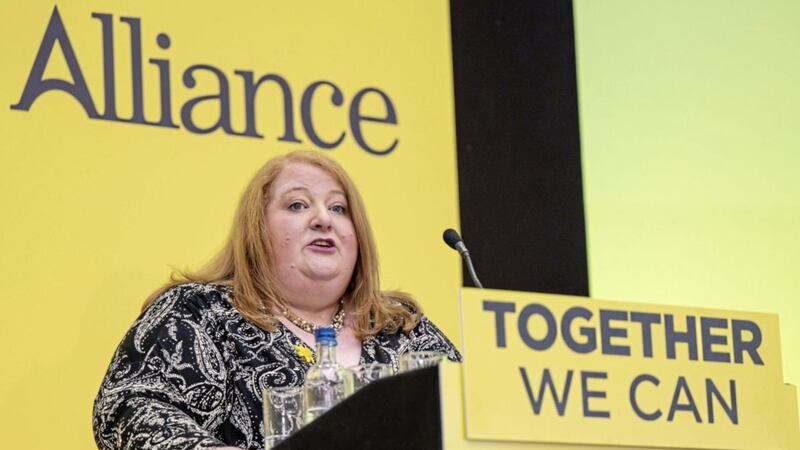In its first election—for the district councils in May 1973—Alliance won 94,474 votes on a 13.7 per cent share.
That made it the largest party after the Ulster Unionists, dwarfing the DUP and Vanguard and nudging ahead of the SDLP by almost 2000 votes. Yet a month later, in the election to what became known as the Sunningdale Assembly, it was down to 66,541 votes and fifth position.
It wasn’t until 2019—46 years later—that Alliance crossed the 94,474 threshold (and let’s not forget that the electoral roll had increased quite significantly) in that year’s Euro election. With 105,928 votes and an 18.5 per cent share (which saw Naomi Long elected as an MEP) it suggested that the ‘surge’ hinted at in the council elections a few weeks earlier should be taken seriously. And six months later, in the general election, Alliance won its highest ever number of votes—134,115.
Alliance tends to do better during a crisis. Its best assembly performance in terms of votes was in March 2017 when, having averaged 6.4 per cent in the previous five assembly elections, it rose to 9 per cent and 72,717 votes, a 20,000 increase on its previous best. That election, remembered as the ‘crocodile’ election, saw the DUP and SF at their most divisive and acrimonious.
The three elections in 2019 (council, European and general), fought against the background of Brexit and the DUP’s successive run-ins with the Conservatives, saw Alliance increase its vote on each occasion. Those figures, tied in with its performance in March 2017, confirm my view that crisis helps Alliance. People seem to turn to it (rather than the UUP and SDLP) when they’re particularly fed up with the sparring between the DUP and SF.
Look at the assembly election in 1998, for example. As a party which had been unambiguous in its approach to power sharing and cross-community cooperation and integration since it was founded in 1970, it might have been expected to do particularly well on the back of an agreement which appeared to copper-fasten those principles, Instead, it managed only 52,636 votes, a 6.5 per cent share and running almost 100,000 votes short of the UUP, SDLP, SF and DUP. It had to wait until the 2017 election before it increased its 1998 vote.
So, the question on the lips of the members at Saturday’s party conference was a simple one: would the ‘surge’ continue and see their seat numbers soar comfortably into double figures? The assembly is where the real action is in local politics, but with just eight seats it is difficult for the party to have the influence it is desperate to wield. It knows, too, that yet another disappointing result—the absence of the breakthrough it thinks is just around the corner, on May 5—would be a hammer blow to morale.
The party strategists aren’t predicting it will become one of the big two parties (although some of the members were trying to persuade me otherwise on Saturday), but it hopes to be confirmed as the third in both seats and votes pecking order. That’s why Naomi Long noted, in her conference speech, “People have had enough of the constant dramas and the political soap operas. They want politicians who don’t just identify more problems—or worse still, add to them—but who are focused on finding solutions and making things better.”
Alliance has had previous false dawns. In May 1973 it looked like the major political/electoral breakthrough following the closure of the NI Parliament, the introduction of PR and the requirement for mandatory power sharing. In 2010, Long’s defeat of Peter Robinson in East Belfast (once regarded as the electoral jewel in the unionist crown) was hailed as a “new day for doing politics differently in Northern Ireland.” Will this ‘surge’ turn out to be another false dawn?
I don’t think so. It has tapped into a vote which isn’t obsessed with the constitutional question: an issue which it seems to rate as less important than a raft of other socio/economic issues. In spite of recent criticism from both nationalism and unionism about where it would stand in the event of a border poll (and opinion polling suggests its supporters split almost equally between pro-union/pro-Irish unity/undecided) Naomi Long seems fairly relaxed about the prospect of being electorally damaged by maintaining what might be described as an agnostic approach.
More important, there seems to be a growing sense within some sections of the electorate that a vote for Alliance wouldn’t be a wasted vote. And once a party reaches that position then the gap between a ‘perhaps a first preference’ and a definite first preference tends to close very quickly during the campaign. Which means, at the time of writing, that Alliance’s chances of a real, politics-changing breakthrough are high.
Not guaranteed, of course, because this is a long campaign: mistakes will be made, new crises will emerge and some candidates will start to sound overly cocky on the doorstep. Yet if it doesn’t make the breakthrough this time—after 52 years of trying—the party will have a lot of explaining to do.








